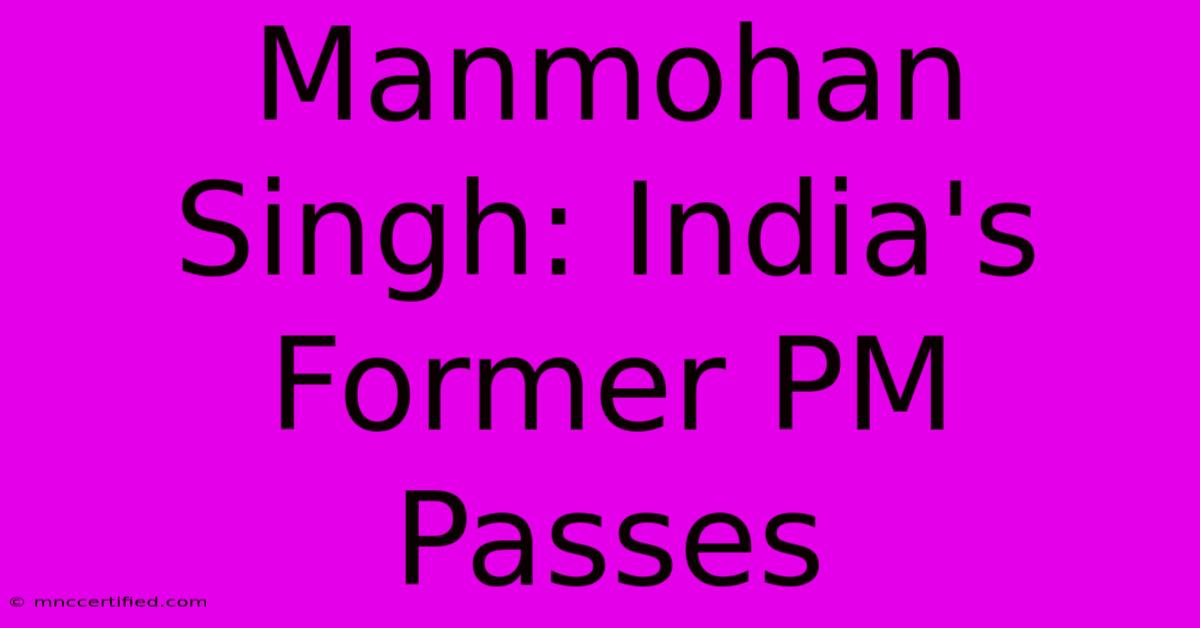Manmohan Singh: India's Former PM Passes

Table of Contents
Manmohan Singh: Remembering India's Former Prime Minister
Manmohan Singh, India's former Prime Minister, passed away on [Date of Passing - Insert Actual Date Here]. His death marks the end of an era in Indian politics, leaving behind a legacy both celebrated and debated. This article explores the life and career of this remarkable figure, examining his contributions to India's economic liberalization and his tenure as the country's leader.
The Architect of Economic Reform
Before becoming Prime Minister, Manmohan Singh's reputation was firmly established as an economist. His pivotal role in initiating India's economic liberalization in the early 1990s, as Finance Minister under P.V. Narasimha Rao, solidified his image as the "architect of modern India." These bold reforms, including deregulation, privatization, and opening up the economy to foreign investment, laid the groundwork for India's subsequent economic growth. His understanding of global economics and his careful, considered approach to reform were instrumental in steering India towards a more market-oriented economy. This period is often referred to as the Manmohan Singh economic reforms or the 1991 economic reforms.
Key Economic Achievements:
- Liberalization of the Indian Economy: Singh spearheaded the dismantling of the License Raj, a system of complex regulations that stifled economic activity. This was a crucial step in fostering entrepreneurship and attracting foreign investment.
- Financial Sector Reforms: Significant reforms were undertaken to modernize the banking sector and improve financial markets.
- Trade Liberalization: India gradually opened its markets to international trade, leading to increased exports and integration into the global economy.
Ten Years as Prime Minister: A Legacy of Mixed Opinions
Manmohan Singh served as Prime Minister of India for two consecutive terms, from 2004 to 2014, leading the United Progressive Alliance (UPA) government. While his economic expertise was widely acknowledged, his time as Prime Minister was marked by both successes and considerable criticism.
Achievements During his Premiership:
- National Rural Employment Guarantee Act (NREGA): This landmark legislation guaranteed 100 days of wage employment to rural households, significantly impacting poverty reduction.
- Right to Information Act (RTI): This act empowered citizens by providing access to government information, promoting transparency and accountability.
- Significant Infrastructure Development: His government invested heavily in infrastructure projects, including roads, power, and telecommunications.
Criticisms and Controversies:
Despite his achievements, Singh's tenure also faced significant criticism:
- Corruption Allegations: Several major corruption scandals during his time in office severely impacted public trust and damaged the government's reputation. The 2G spectrum scam and the Commonwealth Games scandal are prime examples.
- Policy Paralysis: Critics argued that the government was often indecisive and lacked the political will to implement necessary reforms effectively.
- Economic Slowdown: The latter part of his premiership saw a slowdown in economic growth, raising concerns about the sustainability of the earlier reforms.
A Quiet and Reserved Leader
Manmohan Singh was known for his quiet and reserved demeanor, a stark contrast to the often boisterous style of Indian politics. This understated nature, while sometimes seen as a strength, also led to criticism regarding his perceived lack of strong leadership in addressing critical issues. His approach was often described as intellectual and pragmatic, prioritizing consensus-building over assertive decision-making.
Conclusion: A Complex and Enduring Legacy
Manmohan Singh's passing leaves a void in Indian politics. His legacy is complex and multifaceted, encompassing both significant achievements and considerable shortcomings. His role in India's economic transformation remains a cornerstone of his contribution, while the controversies of his premiership continue to fuel debate. Regardless of differing opinions on his leadership, his impact on India's economic and political landscape is undeniable, making him a significant figure in modern Indian history. The discussions surrounding his life and career will undoubtedly continue for years to come. He will be remembered as a highly influential figure who shaped the economic trajectory of India and left an indelible mark on its political history. His contributions to the nation, both before and during his time as Prime Minister, will remain a subject of discussion and analysis for generations to come.

Thank you for visiting our website wich cover about Manmohan Singh: India's Former PM Passes. We hope the information provided has been useful to you. Feel free to contact us if you have any questions or need further assistance. See you next time and dont miss to bookmark.
Featured Posts
-
Big After Christmas Sales Shop Now And Save
Dec 27, 2024
-
New Chinese Advanced Fighter Jet Flight Test
Dec 27, 2024
-
China Unveils New Stealth Jet
Dec 27, 2024
-
Outnumbered Christmas Hugh Dennis Performance
Dec 27, 2024
-
Warriors Meeting Before Loss To Lakers
Dec 27, 2024